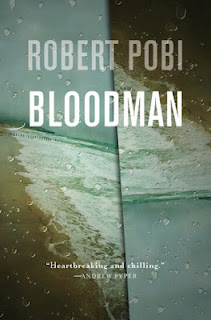(This post is part of the Wunderkind PR Blog Tour to promote Robert Pobi's book "BLOODMAN". As I am on the road until Monday and have been experiencing technical difficulties with hotel servers, I am unable to post an interview at the moment --I even have problems posting this update! In the meantime, you can read my review of the book. Better yet, just read the book, and then come back in a day or two for Part One of my long interview with the interesting and sympathique Robert Pobi).
Canto XII of Dante’s Inferno takes place in the First Ring of the Seventh Circle of Hell where sinners who used violence against others suffer for all eternity in a boiling river of blood.Bloodman is Montreal writer Robert Pobi’s first novel. FBI special agent Jake Cole has Dante’s twelfth Canto tattoed all over his body. Cole, who specialises in hunting down killers, is back in his childhood neighbourhood of Montauk, Long Island, to care for his mentally ill father. They have been estranged from each other for nearly 30 years but they still have something in common. While his father is a talented and famous painter, Jake hunts down killers for whom murder is an art. He possesses the uncanny ability to decipher the modus operandi of a killer, to figure out their artist-specific language and the personal symbolism and subtext in their work.
While Jake tries to put his dad’s house in order, he's called to put his talent to use by helping the local sheriff solve the gruesome murders of a mother and her child. As if that wasn’t enough, one of the strongest hurricanes ever is nearing the island. While residents start evacuating, other murders are committed and it becomes clear that the killer is getting closer to Jake, threatening his own wife and young son. It gets even more personal when Jake finds clues left by his father who seems to have known about a possible threat, and might even know who the killer is. But with his father now lying in a hospital bed, heavily sedated following a serious injury, Jake will need to resolve things without him.
Characters like Sheriff Hauser, Jake’s uncle Frank, and Spencer, an old friend who is now a cop, all bring a touch of normality and humanity to a twisted and disturbing world where victims are skinned alive and bleed to death. Although they try to assist Jake, there’s not much this trio can do as he’s the only one who can really make sense of this madness. Everyone else becomes a witness to his descent to a hellish place as he tries to stop the flow of blood, while avoiding ending up in its river.
The pace of the story is incredibly intense and the resolution of the plot becomes even more urgent as we learn about events from Jake’s childhood. Add to that an ominous atmosphere not unlike the one in Dennis Lehane’s Shutter Island, plus a serial killer both as twisted and intelligent as any created by Thomas Harris. Even if the approaching storm is not a very original method of heightening the sense of urgency, Pobi never lets its presence overtake his plot. In fact, the hurricane works well here as a metaphor for the powerful maelstrom sucking up Jake’s life in its vortex.
Pobi writes like a seasoned author, very much in control of language and rhythm. One aspect that might bother some readers is that he consciously leaves some questions unanswered. But for those like me who enjoy a few open threads that make you think about a book for a while longer, it is a very satisfying read. Bloodman is a literary thriller written with a great sense of timing and with visual qualities that make the whole story an unnerving film in the mind's eye. It will surely make a lasting impression, and a few scenes might even haunt me as long as the wheelchair scene in Red Dragon has since the 1980s. I can’t reveal them here because that would ruin the surprise. You’ll just have to take my word for it and read the book.
JF
July 2012
-30-





